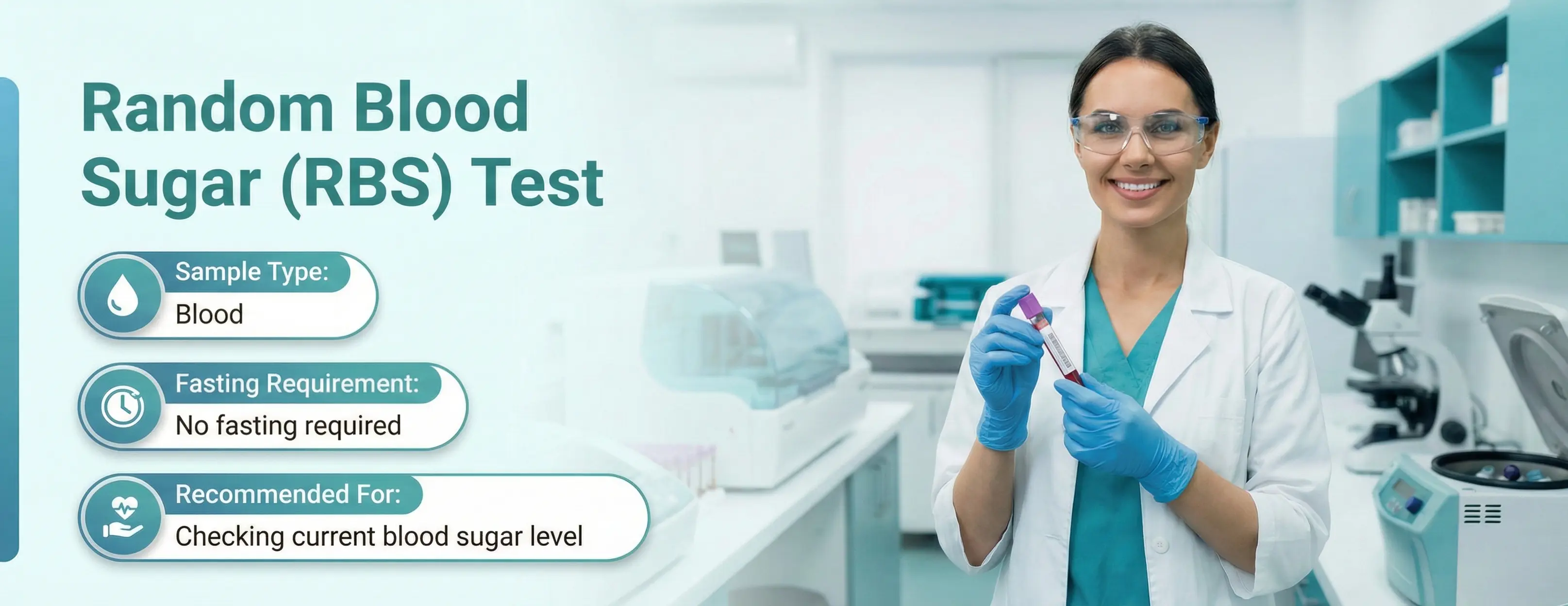1631+ orders placed in your location
100% NABL & ISO Certified Lab • 100% Accurate Reports
Random Blood Sugar (RBS) Test
Random Glucose test, Random Plasma Glucose test, Casual Blood Glucose test (CBG test), Glucose test
- SummaryA Random Blood Sugar test checks your circulating blood sugar level at any time. It measures the amount of sugar or glucose present in a person’s blood. A Random Blood Sugar test is done by taking a blood sample from a finger prick or from a vein in your arm, fasting is not required for this test. Read more
- Reports Within9 HrsView Sample Report100% NABL & ISO Certified Labs
- SampleBlood
- AgeAll Age Group
- GenderMale and Female
- FastingNot Required
PharmEasy Promises
Know More About The Test
A quick info on RBS test
Overview
Glucose is the primary form of sugar found in your body. This sugar comes from the food you intake and is circulated throughout your body as an energy source. Blood sugar plays a vital role in providing your body with the essential nutrients required for the efficient functioning of all organs.
The glucose that enters your bloodstream is kept in check by certain hormones released by the pancreas, such as insulin. The insulin hormone is responsible for sending excessive blood sugar from the blood into the liver. Here, it is stored in the form of glycogen, which can be later used by the body to raise blood sugar levels.
Diabetes is a medical condition in which your body fails to produce enough insulin or the produced insulin is ineffective at controlling your blood sugar levels. Diabetic patients must keep their blood glucose levels under check to avoid complications.
A Random Blood Sugar test is a method that checks your circulating blood sugar level at any time.
A Random Blood Sugar test is prescribed for people who display symptoms such as frequent urination, unexplained weight loss, increased appetite, extreme fatigue and blurred vision. These symptoms can be an indication of increased blood sugar levels (Diabetes). Symptoms such as feeling extremely thirsty and a slow wound healing rate also call for a Random Blood Sugar test.
The result of the Random Glucose test helps a doctor in determining your chances of having diabetes. Subsequent tests are needed to come to a final diagnosis.
Approximately 77 million people in India are affected by diabetes. The condition’s prevalence falls in the range of 10.9% to 14.2%, whereas in rural India, around 3.0-7.8% of the population is affected by the disease. Individuals older than 50 years are more likely to suffer from diabetes. Researchers have predicted that around 134 million people will have diabetes by 2045.
Sample Type
The result of a Blood Sugar Random test is evaluated through a blood sample and analysing the blood sugar level present.
Risk Assessment
Prediabetes, Diabetes, Hyperglycemia, Hypoglycemia
What does this test detect?
Some conditions for which a Random Blood Glucose Level test can be prescribed are:
- Type 1 diabetes
- Type 2 diabetes
- Prediabetes
Your doctor might also recommend a Random Blood Glucose test if you have risk factors of developing diabetes, such as high blood pressure or being overweight.
Indications for RBS Test
A doctor may recommend a Random Blood Sugar test if a person shows the following symptoms:
- Frequent urination
- Extreme thirst
- Sudden weight loss
- Tiredness or increased fatigue
- Feeling hungry despite eating
- Blurry vision
- Slow wound healing
- Tingling in extremities
- Have a dehydrated skin
- Low immunity
The results of the Random Blood Sugar test depend on what and when you have eaten. The following factors can influence a person's blood sugar level:
- Low levels of physical activity
- Illness
- Stress
- Overeating food
- Dehydration
- Alcohol
- Lack of sleep
- Medications
In case your blood sugar level is high, your doctor may prescribe you a fasting blood glucose test or oral glucose tolerance test for a complete diagnosis.
How frequently should you take this test?
Doctors prescribe a Random Blood Sugar Test when a patient comes in with symptoms of diabetes such as tingling in the arms and legs or unexplained fatigue. The test is a vital part of managing diabetes. If you are diagnosed with diabetes, you may need to measure your blood glucose levels several times a day. If there is a vast difference in your blood sugar levels throughout the day, you may need to tweak your management plan.
Test Preparation
The Random Blood Glucose test doesn’t require any fasting or preparation. The sample can be taken at any time of the day, irrespective of your last meal. Blood is drawn from your fingertip through a small prick that is wiped onto a test strip. This tests the blood sugar level at that given time. The test takes about three to five minutes.
Before the Test
Generally, no special preparations are required for the Random blood sugar test. If your doctor recommended this test along with another one, your healthcare provider may advise avoiding certain foods. It is always a good idea to consult your doctor before any test for the best results.
During the Test
A blood sample will be taken from a vein in your arm. Here is what you can anticipate during the test:
- The phlebotomist will cleanse the area where the needle will be inserted with an antiseptic.
- A tourniquet will be placed around your arm to make the veins more prominent.
- A needle will be inserted into the vein to draw blood. This process may cause a brief pinch that lasts a few seconds.
- The blood will be collected in a vial or small test tube and a label on the vial will be filled up with your information.
After the Test
Once the blood has been collected:
- A bandage will be applied to the puncture site to stop any bleeding.
- Mild bruising is normal. Some people feel dizzy, and in such cases they are advised to sit for a few minutes.
- If you notice bleeding, pain, or rashes at the puncture site, contact your healthcare provider.
Parameters
A random blood glucose test measures the quantity of glucose level circulating in your blood at a given time. This provides an idea about whether or not you are likely to develop diabetes. The Random Blood Sugar test results evaluate whether your glucose level is higher or lower than an average value. Glucose levels higher than usual indicate that your body is not producing enough insulin to utilise excessive sugar.
For adults without diabetes, a Random Blood Glucose test would reveal their glucose levels as remaining relatively stable throughout the day.
Ranges
Plasma Glucose Test | Normal |
Random | Below 200 mg/dl |
The normal values and reference ranges of the test may vary from lab to lab. Please refer to the ranges mentioned in the report and consult a doctor to understand the interpretation of lab reports.
Generally, people who don’t have diabetes have around 140 mg/dl or lower blood sugar levels. A 2015 study indicated that a value above 100 mg/dl is a more significant risk factor for developing diabetes than traditional factors such as being overweight.
Prediabetes means that a person’s blood sugar levels are higher than the average value. However, that is not considered diabetes and doctors advise further tests to determine the final result. People with prediabetes are more likely to contract diabetes later.
Doctors advise lifestyle modifications and exercise to such patients. They may also be advised to take Fasting and Postprandial Blood Sugar tests every two to three months to evaluate if the changes are benefitting the patient.
Test Result Interpretation
Random Blood Sugar tests the level of glucose in your blood. This helps in determining if your body is producing enough insulin for the optimal functioning of all organs. A Random Blood Glucose value higher than normal and below 200mg/dl puts you at risk of developing diabetes.
This would call for frequent tests as suggested by your doctor and specific changes in your daily lifestyle to prevent your glucose levels from rising any further.
Exercising, eating the right food and taking some medications are the traditional ways of managing prediabetes. People who are overweight or have a hereditary problem of diabetes are at a higher risk of developing diabetes. If your Random Blood Sugar test levels are 200 mg/dl or higher, then the test indicates that you have diabetes.
This means that the cells present in the pancreas are not producing optimal insulin to utilise excess sugar from the circulating system. Your doctor will probably prescribe another Random Blood Sugar test on a separate day to recheck the values.
Depending on the result, your doctor might recommend some more tests to determine Type 1 or Type 2 diabetes diagnosis. The final diagnosis will allow them to select a management plan that works best for your disorder.
If diagnosed with diabetes, you must follow your doctor’s orders and check your blood glucose levels frequently, as advised by your physician. People with type 1 diabetes may have to check their blood sugar levels several times a day.
The result of your Random Blood Glucose test depends on a range of factors. This includes a person's food intake, the time of the last meal and any exercise or physical activity carried out that day. However, the blood sugar level of non-diabetic people remains stable throughout the day.
The best way of keeping track of your blood glucose levels is by tracking them regularly or as advised by your doctor. If your blood sugar levels constantly remain high for days, consult your physician for a better management plan.
Price/Cost
The price of a Random Blood Sugar (RBS) Test can fluctuate based on the location and chosen laboratory. Generally, the cost of a RBS test falls within the range of INR 89 to 275. Let's take a look at the average cost of a RBS test in some major cities in India:
City | Min price | Average price | Max price |
89 | 182 | 275 | |
89 | 182 | 275 | |
89 | 182 | 275 | |
89 | 182 | 275 | |
89 | 182 | 275 | |
89 | 182 | 275 | |
89 | 182 | 275 | |
89 | 182 | 275 | |
89 | 182 | 275 | |
89 | 182 | 275 |
Risks and Limitations
The Random blood sugar test is accompanied by a low chance of complications.
However, seek medical advice should these issues crop up
- Unabated bleeding at the blood-extraction site
- Pain or inflammation at the puncture.
Limitations of the test
- Potential inaccuracies due to equipment errors, or human mistakes
- Misinterpretation of markers resulting in unreliable conclusions.
Cautions and Warnings
If you are on any medications, tell your doctor about the same as some medicines like diuretics (water pills), corticosteroids or certain blood pressure medications that may cause your blood sugar level to rise.
Was This Test Information Helpful?
Please rate your experience
References
People Also Ask
Is 120 random blood sugar normal?
Can I drink water before I test my blood glucose levels?
What is random blood sugar reading?
How can I test my blood sugar levels at home?
What is the normal range of RBS?
Popular Tests
Have any doubts? Ask us.
Ask us anything about the Random Blood Sugar (RBS) Test to understand it better
We provide trusted, expert-curated health content to support better awareness,prevention, and care.
Backed by experienced doctors, medical experts, and strict editorial standards.


